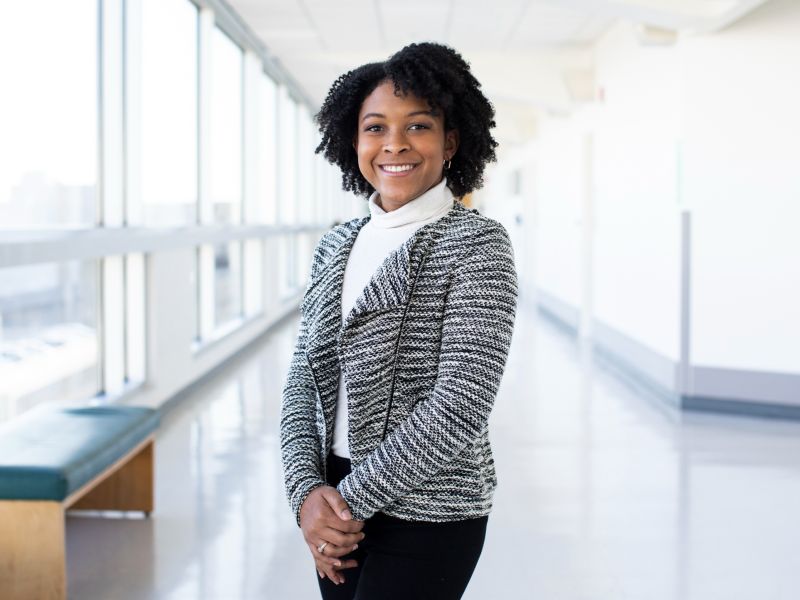
Marissa Pharel is a Haitian American born in New York and raised in San Juan, Puerto Rico. She graduated from Villanova University, where she received her B.S. in psychology, B.A. in Spanish and a minor in cognitive science. She then attended Columbia University, where she obtained her M.S. in human nutrition. Prior to enrolling at RUSH Medical College, she worked at Johns Hopkins on a research project evaluating the effects of moving out of Baltimore on pediatric asthma progression and maintenance. Pharel is passionate about improving medical pipeline programs for underrepresented minorities, increasing healthy literacy and addressing health inequities in low-income, marginalized communities.
Tell us about your background.
As most URM students have experienced, I was constantly dissuaded from applying to medical school. Coming out of college, I allowed myself to believe that I didn't have the qualifications to apply and much less to become a doctor. However, I knew I wanted to work in the medical field, which is why I decided to pursue a Master of Science in human nutrition. Though nutrition remains a passion, I realized I was more interested in the medical applications and wanted to continue broadening my understanding of the human body.
At that point, my graduate professors and advisors passionately supported my desire to pursue medicine, but my doubts were far too ingrained. Instead, I decided to explore the world of research and worked at Johns Hopkins. I worked on a project evaluating the effects of moving out of Baltimore City on pediatric asthma progression and maintenance. I had the opportunity to visit the participants' homes before and after their move, and I worked closely with the family. The participants in this study were predominantly people of color, and I fell in love with the prospect of working with them longitudinally. This experience and the support I received gave me the push I needed to take the MCAT and apply to medical school.
What inspired you to pursue a career in medicine?
My desire to pursue medicine has been a conglomeration of events and experiences: family losses, community losses, societal shortcomings and systemic racism, to name a few. My family is from Haiti, and we lost my cousin when I was about 5 years old to meningitis. Understanding the complexities of Haitian health care access was not possible at such a young age, but what I did understand was the importance of a physician. This seemingly simple solution contributed to my desire to pursue a career in medicine.
However, my desire was cemented many times throughout my life through my trips to Haiti, my experience with Black and Brown patients in Baltimore, and my own experience as a patient. I didn’t have a Black doctor until I was in college. I will never forget the feeling of finally being seen. The possibility of my presence alone serving as a source of solace and comfort really solidified my desire to pursue this career.
What advice would you give someone who is considering medicine?
You have everything it takes to become a physician. The road will be long and tedious, but it will also be bright and filled with hope. On those days when the light at the end of the tunnel seems unattainable, remind yourself of why you want to pursue this career. Think about your patients, think about their families, think about yourself and how fulfilled you will feel. Remember that each journey will look different, and there is beauty in that.
In my experience, the right mindset is half the battle. The other half is support. Surround yourself with people who want you to shine. Surround yourself with people who support and uplift you day in and day out. There is a whole community, myself included, here to support you as you embark on this journey. Do not be afraid to reach out and ask for help when needed. There is power in community.
What are some of the community initiatives you have been involved in or currently working on at RUSH?
Though I participate in a few community initiatives as a general volunteer and steer, such as ASPIRE, SNMA/LMSA Pipeline, and Pilsen Food Dispensary, the main initiative I have been devoting myself to is the Garfield Park Right to Wellness Collaborative (GPRWC). As part of the SNMA President’s project, we have partnered with the GPRWC to bring student- led programming into West Garfield Park. To bring this vision to fruition, we began by conducting community needs assessments at events hosted by the collaborative, such as the Community Plaza groundbreaking ceremony, the Fred Hampton Skate Party, Black Culture Wellness Fest and the Harvest Festival. In addition to obtaining needs assessments, we also volunteer at these events to ensure they run smoothly.
One of our primary goals is to understand the community better and build a relationship with the members to increase the quality of life and wellness in their community as a team. Given the sociopolitical climate and the history of systemic racism in this country, it is no surprise that Garfield Park, a predominantly Black neighborhood, is plagued by disenfranchisement and poverty. This racial injustice is exactly what fuels my desire to go in, listen to the community, and partner with them to find the best ways to support their goals. Beyond the programming we will begin implementing once we’ve finalized the data analysis, we have also been involved in protests and food distribution due to the unexpected closure of the Aldi.
Would you please tell us a fun fact about yourself?
I speak four languages! The first language I learned was French, followed by Haitian Creole at home. I learned English in school while living in New York, and when we moved to PR, I was a 6-year-old quite adamant about not adding another language to her repertoire.
